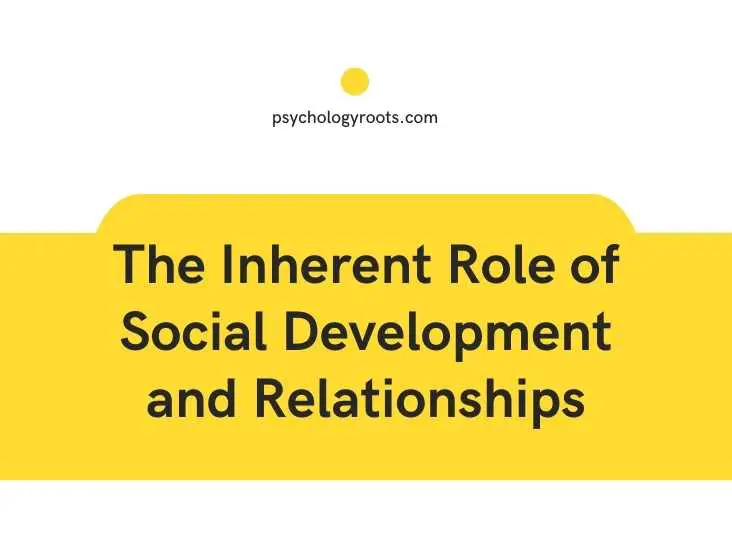Table of Contents
The Inherent Role of Social Development and Relationships
Here in this post, we are discussing and learning about “The Inherent Role of Social Development and Relationships”. You can read more about psychology-related material on our website. Keep visiting Psychology Roots.
If you are talking about the essence of your personality, the character is sometimes referred to as embodying your beliefs and behaviors in isolation from the social environment. Moral integrity, on the other hand, has no value unless it is accompanied by other virtues. Individualism and personal purity are connoted in this cliche, yet it falls short of morality’s most fundamental application: concern for others.
To be fully human, one must have a strong sense of social connection. Only in the presence of other people is moral integrity significant. To emphasize this idea, consider how closely the stages of moral and social growth coincide and intertwine.

The Inherent Role of Social Development and Relationships
Children between the ages of three and five are particularly focused on contributing to their peers’ well-being. A new emotion: guilt, is being explored as they create a feeling of self-determination. As a byproduct of participating in group activities, youngsters learn to deal with their own feelings of shame. Pathological and ethically repugnant, the lack of shame can only be created in social contexts via successful and unsuccessful contributions.
My two youngest children, who are in this age range, are often asking to help crack the eggs and clean up the granola spills at breakfast. The emergence of a person’s sense of agency is essential for moral growth, although I frequently prefer their absence to their detrimental aid. He hopes that they will become individuals who are concerned about others and who take responsibility for the group’s concerns.
Developmental psychologists are especially worried about the lack of social connections and discussions during pandemic-driven social shutdowns because of this age group’s social and moral sensitivity. In contrast to playing alone, playing with others forces youngsters to collaborate and co-negotiate the rules of play.
Many social scientists are concerned about physical punishment because of this age group’s moral sensitivity. Corporal punishment has been shown to have no effect on a child’s ability to internalize virtuous conduct when applied to children aged 3 to 5.
Middle childhood is a period of maturing moral character as one’s social connections and friendships develop and extend. Relationships have a critical role in virtue formation, according to new longitudinal research. There was a correlation between a child’s ability to maintain positive connections with both instructors and classmates, as well as greater levels of virtues such as collaboration and bravery. In addition, as a person’s connections improved through time, so did their virtues, and when a person’s relationships worsened, their virtues declined. While it’s natural to assume that good deeds lead to greater relationships, it’s possible that friendships form before good deeds. In relationships, generosity and self-sacrifice are encouraged while egotism is challenged.
Perspective-taking skills develop rapidly in the developing brain throughout adolescence. This is a crucial antecedent to several virtues, including social responsibility, which involves an understanding of the needs of others and the greater good. Peer relationships and personal identity formation are especially important at this period of rapid societal change. Once again, moral and social growth are intertwined. Inadequate social support and connection may lead to moral disengagement, and by the time people reach adolescence, they are independent enough to conduct significant societal damage while eluding authority officials’ grasp.
When others are not present, it may show the moral fortitude of ethical behavior without peer pressure or censure. Moreover, When a character is seen in this way, its social value is diminished. Because there are other people around, it is necessary to have good character. In reality, it’s not a column, but rather a network of linked anchor points. Among these anchors are mentors who help students understand right and wrong, friends who encourage collaboration and perspective-taking, and those who watch out for others who are younger or more vulnerable. In multi-generational groups, these networks are more likely to be established. These cross-level care groups aren’t likely to form naturally in American culture since it is excessively age-segregated.
Virtues are learned by habitual practice in an Aristotelian framework, according to much empirical study. Family and “polis” (city-state) socialization is aimed at raising citizens who see the greater good, according to Aristotle. People with strong moral character are better equipped to contribute to society as a whole, according to contemporary psychologists like Darcia Narvaez.
The next time you hear the phrase “rugged individual integrity,” think about how the principles came to be. When there are other individuals around, character matters.
Summary
Children between the ages of three and five are particularly focused on contributing to their peers’ well-being. Playing with others forces youngsters to collaborate and co-negotiate the rules of play. As a byproduct of participating in group activities, youngsters learn to deal with their own feelings of shame. Virtues are learned by habitual practice in an Aristotelian framework, according to empirical study. Peer relationships and personal identity formation are especially important at this period of rapid societal change. People with strong moral character are better equipped to contribute to society as a whole.
Help Us Improve This Article
Have you discovered an inaccuracy? We put out great effort to give accurate and scientifically trustworthy information to our readers. Please notify us if you discover any typographical or grammatical errors.
Make a comment. We acknowledge and appreciate your efforts.
If you have any scale or any material related to psychology kindly share it with us at psychologyroots@gmail.com. We help others on behalf of you.